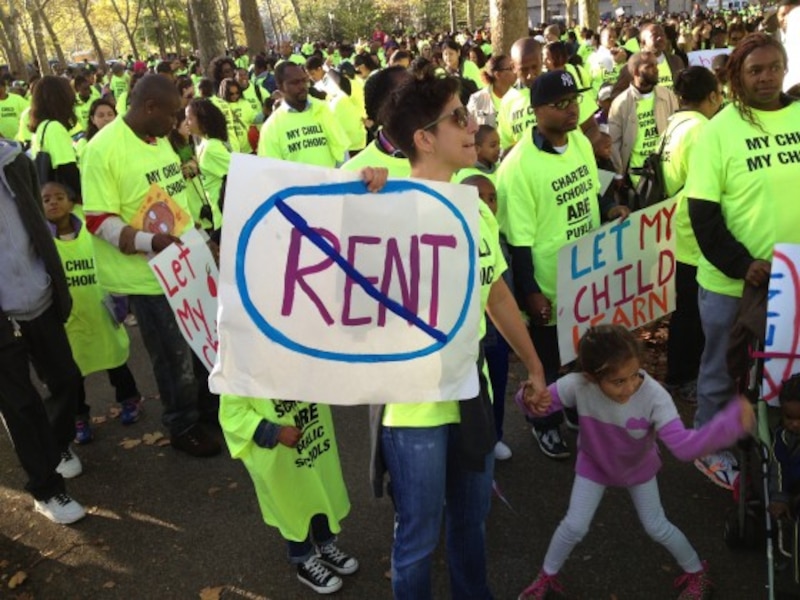
A political rally turned out thousands of parents, students, and staff from the city’s most prominent charter schools for a march across the Brooklyn Bridge and a plea for support from whoever next occupies City Hall.
Dressed in neon yellow shirts and carrying signs to summarize their demands, crowds began assembling in Cadman Plaza around 7:30 a.m and swelled as one chartered bus after another dropped off a new group from a different corner from the city. A stage on the west end of the park blasted music and personal testimonies from teachers, parents, and school leaders invited to speak.
Dozens of schools from at least 11 charter networks were represented at the rally, according to organizers. They estimated that 17,500 people attended.
As the crowd waited to funnel onto the bridge’s walkway — a process that lasted more than two hours because of the mass of participants — parents were unified when asked why they attended.
“We love the school and we just want to make sure the next mayor gets the message,” said Aaron Lieberman, who has two children who attend Harlem Success Academy.
Organizers sought to hammer home a broader message about the role of charter schools in New York City’s school system, which is that parents should be able to choose where to send their child to school.
“It’s only politicians who care about charters or districts,” said Eva Moskowitz, founder of the 20-school Success Academy charter network, which appeared to make up a majority of parents in the crowd. “It really doesn’t matter. The only thing that matters is a school of excellent quality.”
There was nary a reference to the names of candidates vying for City Hall, though Republican Joe Lhota greeted families at City Hall and made clear his support for their schools. But the pleas appeared to fall on deaf ears of Lhota’s opponent, Democrat and frontrunner Bill de Blasio, whose campaign pledges have stirred fear among supporters of charter schools in New York City, which have thrived under Mayor Bloomberg.
De Blasio doubled down on those pledges on Tuesday, saying through a spokesman that “believes that well-resourced charter networks should pay for the use of school space, as charter schools do across the country.” He’d also stop co-locations, an arrangement that has afforded schools free space inside city-owned school buildings, “until we can better assess their impact.”
Both changes would affect a majority of the city’s charter school sector. Over 60 percent of the city’s 183 charter schools are housed in city-owned buildings, and more than half of the city’s 50 proposals for new schools and co-locations involve charter schools.
Dave Levin, co-founder of KIPP, a national charter school network with several schools in the city, said he hoped the rally would show how much support there is for charter schools’ continued growth.
“The reason we have 70,000 kids in charters today in New York City, the reason we have 50,000 kids on wait lists, is because we’ve had access, as public schools serving public school families, to the public facilities,” Levin said, referring to free rent afforded to charter schools in city-owned buildings. “Changing that access would significantly reduce the growth in the number of seats available in New York.”
Charter schools are publicly funded, but privately managed and the vast majority do not employ unionized teachers, one reason they are so divisive. Most have longer school days and year and they typically out-perform their district school counterparts on state tests. On last year’s state tests, Success Academy’s proficiency rates — 82 percent in math and 58 percent in English — was significantly higher than city rates, which were under 30 percent in both subjects.
But charter schools serve fewer high need students than the average charter school, and critics accuse the schools of having policies that dissuade low-performing students from staying enrolled.
They also say one reason that charters have been able to thrive is because of private support from wealthy backers on their school boards, one reason de Blasio has pledged to charge those schools rent.
In response, Moskowitz asked if the policy would be applied for district schools with well-heeled parent groups and foundations that raise money.
“To suggest that because charter schools get some amount of philanthropy to support public education that they pay rent is ridiculous,” she said. “There are district schools in the city of New York whose PTAs raise considerable sums. Are the politicians going to call on them to pay rent?”
Success parents and students, whose participation was urged by Moskowitz and enabled in part because she closed down her schools for the duration of the rally, dominated the rally. Some parents indicated that Moskowitz’s doomsday predictions about the possible fate of charter schools under a new mayor had gotten through.
“I want them to keep the schools open,” said Charlene Porterfield, a Harlem Success Academy 3 parent. “I’m not sure who’s trying to close the schools, but I’m willing to fight.”
De Blasio, who criticized organizers of the rally for using inaccurate scare tactics, has not said he’d close any charter schools. But his plan to put a moratorium on future school proposals could affect Success’ plans to expand its schools into the middle and high school grades.
That would be a shame, Success Academy parents said. Angel Cornejo said she had a “bad experience” in a district school when her son entered kindergarten. She enrolled her son in Bronx Success Academy 3 this year and said she’s seen a big difference.
“He learned more in one week than an entire year at his old school,” Cornejo said.
